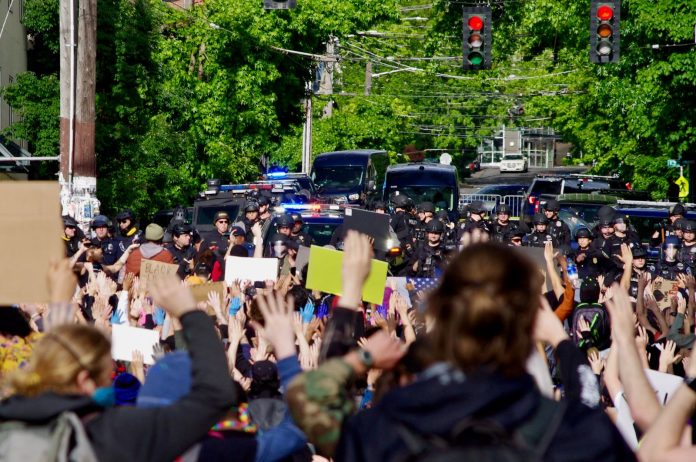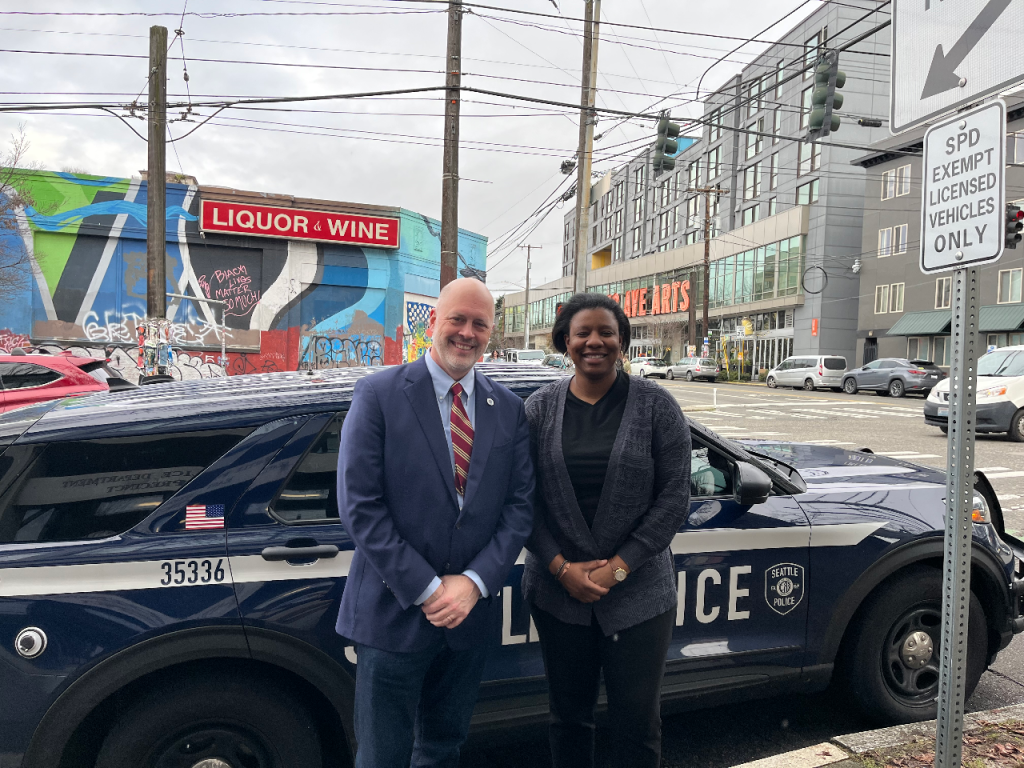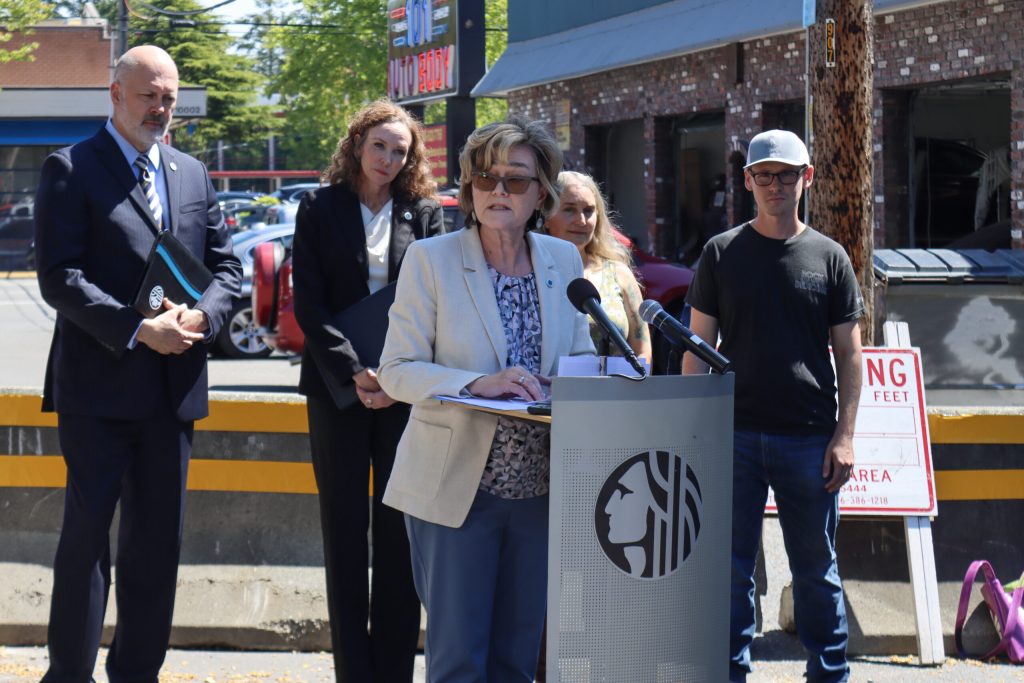
The Seattle City Council’s public safety committee this week voted to move forward with an amended version of Mayor Bruce Harrell’s so-called “less lethal” weapons bill, allowing the Seattle Police Department (SPD) to use weapons such as blast balls and pepper spray at demonstrations and protests.
This new bill would replace prior legislation passed by the Council in 2020 and 2021 in response to SPD’s violent reaction to the George Floyd protests that took place in Seattle. This previous legislation, which heavily restricted the use of most of these weapons, was never allowed to go into effect, blocked by Senior Judge James Robart of the United States District Court for the Western District of Washington. Instead SPD has been operating under an interim policy that doesn’t limit which less lethal weapons can be used.
Councilmembers Bob Kettle, Sara Nelson, and Rob Saka voted to recommend the bill to the full council, with Councilmember Cathy Moore opposing. District 3 Councilmember Joy Hollingsworth, who represents the area of that city that saw some of the most sustained protests in 2020, abstained.
Approval of this policy by the Federal Court is one of the last steps the City needs to take to end the consent decree, which has dragged on for over 12 years.
However, critics worry the new bill will give SPD carte blanche to return to their old, violent ways when it comes to crowd control. SPD use of blast balls and tear gas are of particular concern since SPD’s deployment of both weapons caused many injuries in 2020.
Karen Koehler, the attorney who won the $10 million settlement from Seattle on behalf of 50 protesters who were injured during the 2020 protests, called in during public comment and offered to have individual conversations with any councilmember who wanted to do so.
“I think that you need to talk to me for more than one minute,” Koehler said. “I’ve spent years working on these cases. I have all the information and statistics and experts to help you look at all of these from a different perspective than what you’re being fed by the Seattle Police Department.”
The public comment given at Tuesday’s meeting was overwhelmingly opposed to the new legislation.
Amendments discussed
At the marathon meeting on Tuesday, committee members considered nine amendments and passed three sponsored by Kettle and Saka. All of the amendments Moore put forward, including three authored by Councilmember Alexis Mercedes Rinck — who doesn’t sit on the committee — were shot down by Kettle, Saka, and Nelson.
The amendments that passed make several changes that serve to make the new legislation slightly more restrictive when it comes to the use of these weapons. They make the following changes:
- SPD cannot use blast balls to move or disperse a crowd unless the Mayor has declared a civil proclamation of emergency
- Blast balls shall be deployed when safe and feasible consistent with training in an open space
- Mutual aid officers (officers from other agencies) must agree to accept the command and control of SPD’s incident commander
- SPD must follow more reporting requirements, including reporting on any deployment of less lethal weapons and any new authorization of new less lethal weapons, as well as providing regular and timely review of proposed revisions to SPD’s policy manual.
Amendments that failed included a private right of action for protesters injured by misuse of less lethal weapons, additions to SPD’s purpose statement for their crowd control policy, further restrictions on the use of blast balls, and tougher rules governing the behavior of mutual aid officers.
Lack of agreement over the use of blast balls

The amended bill is still not in line with either recommendations from the Office of Civil Rights or Seattle’s Community Police Commission (CPC).
The CPC agrees with the underlying intent of the bill, writing, “We support the overall approach of the Mayor’s proposed legislation, which focuses on overarching values that guide SPD deployment and intervention in crowd management situations…and which does not place outright prohibitions on the use of specific tools.”
The CPC requested the vote on this ordinance be postponed until they could incorporate community feedback into their letter of recommendations, saying that with the short timeline and holiday season, there hasn’t been sufficient time.
The CPC also included several recommendations in their letter that are not reflected in the most recent version of the ordinance. Most importantly, the CPC says that the use of blast balls should be limited “to their deployment away from people, at a distance of at least 10 yards from any person.” The CPC also recommends the ordinance “require that mutual aid agencies deploying in Seattle agree to abide by Seattle ordinances and SPD policy regarding use of force, including but not limited to those on less-lethal tools and crowd management.”
The rules around blast balls is perhaps the most highly contested question when it comes to Harrell’s bill.
Answering a question about deployment from Saka, co-chair of the CPC Joel Merkel said, “The CPC was focused on ensuring that if a blast ball is used, that it’s directed away from people, away from a crowd, at a minimum distance of 10 yards. Overhand, underhand wasn’t the distinction that was important. It was away from people, rather than at people because,the chaotic nature of that weapon can cause a lot of harm if it’s not directed away from people at a certain distance.”
However, right after Merkel spoke, SPD Assistant Chief Tyrone Davis answered the same question. Davis was introduced as being someone who conducts a lot of SPD’s training on less lethal weapons, and he said, “As we saw this in 2020, there are occasions where there are tactics used, maybe by some of the people doing the demonstrations because they knew we deployed that way, or maybe there are actors in the background that are throwing frozen bottles of water or instruments that could ignite and harm somebody where making a deployment overhand to reach those people are important.”
His words appear to confirm that SPD officers are not currently being trained to always throw blast balls away from people.
SPD Chief Operating Officer Brian Maxey confirmed that SPD hasn’t deployed blast balls since October of 2020, meaning any change of tactics regarding their deployment remains untested in real-life situations.
Councilmembers get personal
In perhaps the most bizarre turn of the meeting, D1 Councilmember Rob Saka mentioned a few separate times that he had requested the chance to have SPD deploy blastballs in his vicinity during a recent tour so he could experience their impacts firsthand. The Mayor’s Office turned down his request.
“Apologies to [SPD Chief Operating Officer] Mr. Maxey for putting them on the spot. Sprung up on them a request last minute at that site visit to personally get that demo and see what the blast balls are like,” Saka said in his closing remarks. “I put them in an uncomfortable, untenable position when that is something I ultimately came to my senses and it’s like, you know, you’re right, let’s do this the right way.”
On a more somber note, Kettle digressed by talking about the harms of under-deployment during his time in Iraq and how it led to abuses he said Camp Cropper was able to avoid. “And when the reports came out on the abuses, Camp Cropper and the Military Police Battalion that worked with us was the silver lining of that entire report, and the reason why is because we ensured that it was well-resourced,” Kettle said.
However, a report from the Red Cross mentions that the places of internment in Iraq “where mistreatment allegedly took place” included the military intelligence section of Camp Cropper. And the Center for Public Integrity reported that, “Cropper was a really, really horrible place, in the early days in particular,” one Iraq Survey Group member acknowledged during a recent background discussion.”
This report seems to suggest that prisoners of war at the time were tortured at Camp Nama and then transferred to Camp Cropper for interrogation.
About his service, Kettle said, “I was assigned to the Iraq Survey Group (ISG) located at Camp Slayer as the Executive Officer to the Director of ISG from December 2003 to June 2004. Our unit was responsible for debriefing senior Iraqi officials. These individuals were held at Camp Cropper.” He continued that the battalion was noted afterwards as “having done the job right.”
Council opinion remains mixed

While Kettle, Saka, and Nelson supported the bill, Moore remained unconvinced, an opinion that was probably not helped by her colleagues voting down all her proposed amendments.
“The fact that we’re going from essentially having a policy, even though it wasn’t implemented because of the consent decree, that said no blast balls to one that kind of turns it over to the discretion of the department is troublesome,” Moore said. “I think we can do better, and so I will not be supporting this today.”
Rinck agreed with her colleague. “When Seattle residents go out to exercise their First Amendment rights of speech and assembly, they should be able to have the peace of mind that they will not be injured by their own law enforcement,” Rinck said. “They should also trust that the law enforcement that may be on the ground is also abiding by the laws within the city, laws and policies.”
Meanwhile, Hollingsworth chose to abstain.
“I’m also very aware in my district the actions that were taken during 2020, in the history that that has, and we’ve had public commenters come and speak today and online, and we’ve received emails from folks,” Hollingsworth said. “I’ll be super frank, I have shared this privately and publicly, that this was not a priority of mine.”
She went on to question why council is discussing less lethal weapons policy given police understaffing and lack of police response to “break-ins, vandalism and robberies.” She also spoke of her gratitude for SPD.
Kettle said he expects the full council vote on this bill to take place on Tuesday, February 4. This delay will mean that the newly appointed councilmember from District 2, replacing Tammy Morales who resigned earlier this month, will be able to take part in the vote.
Amy Sundberg is the publisher of Notes from the Emerald City, a weekly newsletter on Seattle politics and policy with a particular focus on public safety, police accountability, and the criminal legal system. She also writes science fiction, fantasy, and horror novels. She is particularly fond of Seattle’s parks, where she can often be found walking her little dog.

